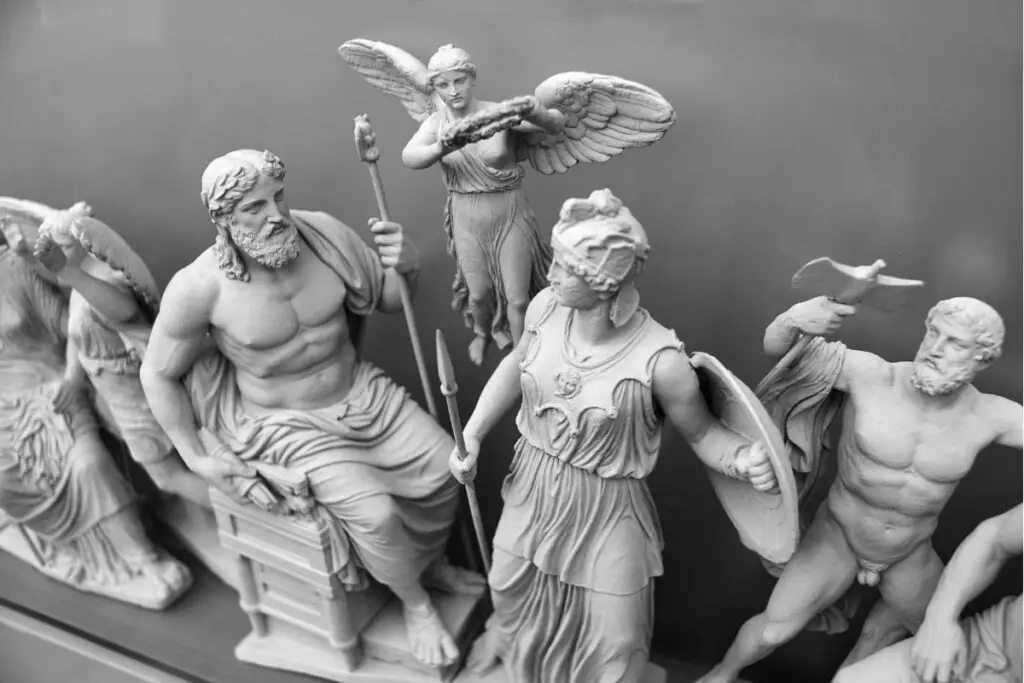Have you ever wondered how to create a god for your story or even for a new religion? It’s a fascinating process that requires imagination and a deep understanding of human nature.
Creating a god can be an engaging way to explore the dynamics of belief systems, power structures, and values within societies.
In the realm of fiction, particularly in science fiction and fantasy, gods play a significant role in world-building. They shape the culture, history, and laws of the worlds they inhabit, as myths and legends often incorporate these powerful beings. For example, Greek mythology offers an extensive pantheon that has influenced literature and art throughout human history.
So, how do you create a god that resonates with readers, taps into deep-seated beliefs, and reflects the needs and desires of those who worship them?
It all starts with understanding the purpose of your god, the values they represent, and the captivating stories that showcase their powers and influence.
Understanding The Concept
Defining ‘God’
When trying to create a God, it’s essential to understand what the term ‘God’ means.
In general, a God is considered to be a supreme, all-powerful, and divine being that transcends human comprehension. The concept of God often includes attributes like omniscience (all-knowing), omnipotence (all-powerful), and omnipresence (present everywhere).
Various Perspectives
It’s crucial to recognize that the concept of God varies significantly among different cultures, religions, and belief systems.
For example, within Christianity, God is usually understood as a personal, omnipotent creator and God’s traits include judge, savior, and lord of history. In contrast, other religions such as Hinduism or Buddhism have multiple deities with diverse characteristics and functions.
Understanding these various perspectives will help you create a well-rounded and informed concept of a God, which can serve as the foundation for your creation.
Historical Context
When creating a God, it’s also essential to consider the historical context and development of the concept of God across different societies and time periods.
Some of the earliest concepts of divine beings can be traced back to ancient civilizations, like Egypt, Mesopotamia, and Greece, where deities were often associated with natural phenomena or rulers.
Over time, the attributes and functions of these gods have evolved, and new philosophical arguments, such as moral arguments for the existence of God, have impacted many belief systems.
By examining the historical context, you can gain insight into how humans have tried to make sense of the divine and draw inspiration for shaping your own concept of a God.

Creating A Conceptual God
In this section, you’ll learn how to create a conceptual god by defining their characteristics, assigning roles, and establishing a narrative.
Remember to keep it friendly and concise, while engaging the reader.
Defining Characteristics
Start by brainstorming your god’s distinguishing features.
Consider physical appearance, personality traits, and symbolic elements. For instance, your god could be an animal, humanoid, or shape-shifter. They might embody wisdom, love, or vengeance. Use your creativity and think of unique attributes that make your god stand out.
Assignment of Roles
Next, decide on the roles and responsibilities your god will have.
Some gods are creators or protectors, while others are tricksters or bringers of natural disasters. Defining clear roles for your god helps establish their importance and influence in your world. For example, you may create a god of:
- Weather
- Fertility
- Knowledge
Establishing a Narrative
Finally, create a compelling backstory and a set of myths surrounding your god.
This is crucial for engaging your audience and adding depth to your world. Consider the following:
- How was your god born or created?
- Did they have any conflicts with other gods or supernatural beings?
- Are there any rituals or festivals dedicated to them?
By focusing on these elements, you will develop a well-rounded and intriguing conceptual god that will captivate your readers and enrich your world.
Manifesting into Reality
Psychological Techniques
To create a god, start with psychological techniques to shape your beliefs and intentions.
Visualize the god you want to manifest and imagine the traits, abilities, and purpose they possess. Spend time meditating on this image, focusing on the emotions it evokes, and the ways this god can positively impact your life and the lives of others.
By doing so, you’ll create a strong foundation for your manifestation process.
Cultural Integration
Next, integrate your god into your daily cultural practices and rituals.
This can include prayer, worship, and celebration. When incorporating your god into your culture, consider their unique attributes and find ways to adapt existing practices or create new ones that honor and celebrate the presence of this god.
This not only strengthens the connection between you and the god, but also helps to spread their influence within your community.

Building a Community
Finally, to truly manifest this god into reality, it’s important to build a community of individuals who share your beliefs and values.
Connect with others who may also resonate with the god you’re manifesting, and work together to create a shared spiritual experience.
By doing so, you’ll create a collective energy that has the power to bring the god’s presence into reality, reinforcing their existence and immersing them into your cultural narrative.
Remember, the stronger your community is, the more vibrant and sustaining the god’s presence will be.
Ethical Considerations
When creating a god, it’s essential to consider the ethical implications of such an endeavor.
This section will discuss three primary areas of concern: potential misuse, respecting beliefs, and promoting positivity. By being mindful of these factors, you can ensure that the god you create has a positive impact on the world.
Potential Misuse
Be cautious of the possible ways your created god could be misused by others.
Keep in mind that people might take advantage of the deity’s influence for personal gain or to manipulate others. To prevent this, establish a clear code of ethics surrounding the worship and interaction with your god.
Respecting Beliefs
It’s crucial to respect the variety of beliefs and faith systems that exist in our world.
When creating your god, be conscious of how it may impact the religious landscape and how it may be perceived by people of different faiths.
Make an effort to understand existing religious beliefs and strive to create a god that doesn’t minimize, invalidate, or dismiss the significance of those beliefs.
Promoting Positivity
The core purpose of your god should be focused on promoting positivity and uplifting values.
This deity ought to inspire followers to exhibit virtues like kindness, empathy, and compassion in their daily lives.
By emphasizing these positive qualities, you will help foster a more harmonious community where everyone thrives and grows.

Further Exploration
Advanced Techniques
In this journey to create a god, you may come across various advanced techniques that will help you better understand the concept.
Some of these techniques could involve deeper philosophical discussions or delving into religious texts.
Make sure to approach these resources with an open mind and willingness to learn.
It would be advisable to explore various sources and writings from different cultures and belief systems to gain a well-rounded understanding.
Case Studies
Another helpful way to expand your knowledge is by analyzing case studies of other individuals or groups who have attempted to create or understand the concept of a god.
By looking at their successes, challenges, and experiences, you can better prepare yourself for your own exploration.
You can find these case studies in books, articles, documentaries, or even by speaking to experts and practitioners in the field.
Remember, every piece of knowledge is valuable and contributes to your growth.
Future Directions
As you continue on this path, it’s important to think about the future and how your newfound understanding will shape it.
We live in a constantly evolving world, and the aspects of creating and understanding a god are no exception.
Looking forward, you might consider engaging with cutting-edge research, participating in discussions around new ideas, and keeping an eye on emerging trends.
By staying up-to-date, you’ll be able to integrate these developments into your own thought process and gain new insights.
